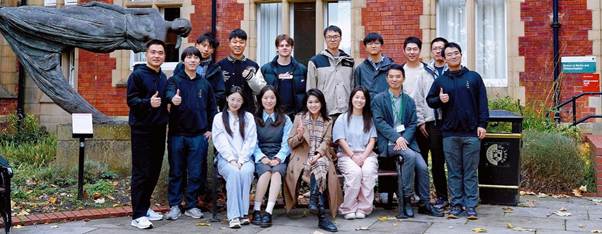The Most Popular Teachers of the Joint School: Professor Zheng Wang

| Personal information: I am Professor of Intelligent Software Technology in the School of Computer Science at the University of Leeds and a Royal Society Industry Fellow. I serve as Program Co-director for the Leeds–SWJTU BSc Computer Science Program and was the module lead for XJCO1211 Computer Architecture and XJCO1921 Programming Project in the 2024/2025 academic year.
Motto: Learn Globally, Build Locally, Think Boldly.
|
Teaching and Leadership at the Joint School
I began teaching in the Joint School during the 2020/2021 academic year. I initially led the XJCO1921 Programming Project module, and from 2022/2023, I also took on the role of module leader for XJCO1211. In 2024/2025, I was appointed Program Director of the BSc Computer Science Program in the Joint School, where I now oversee new curriculum development, academic quality, and student experience. Working closely with students and colleagues in Chengdu has been one of the most rewarding aspects of my career.
Academic and Research Achievements
I develop tools and techniques to make software development more accessible, enabling programmers to write, maintain, and optimise code more effectively. My research combines practical system building with real-world validation on modern hardware and workloads. I lead the Intelligent Systems Software Lab (https://issl-uk.com/), where we focus on compiler and OS-level optimisations for performance and energy efficiency, machine learning techniques for bug detection, uncovering over 200 bugs in real-world projects, and scalable deep learning. I also apply machine learning to areas such as natural language processing, data mining, and wireless sensing. My work has been recognised with five best/distinguished paper awards, a test of time award, and three additional best paper nominations at top-tier ACM/IEEE conferences. My research has been adopted by companies including IBM, Meta, Alibaba, Tencent, Huawei, and Codasip, and has contributed to the creation of a university spin-out company. I currently hold a Royal Society Industry Fellowship.

Reflections on the Joint School and Life in Chengdu
Being part of the Joint School has shaped not only my academic work but also my personal outlook. The combination of UK and Chinese academic traditions creates a uniquely stimulating environment for learning and collaboration. Chengdu itself offers a rich cultural backdrop, known for its relaxed pace of life, strong food culture, and rapidly growing tech scene. These experiences have broadened my perspective on international education and shaped how I think about global collaboration in teaching and research.
To Students: In coding and cross-cultural learning, remember: Computer science is more than lines of code—it’s the courage to think boldly, the wisdom to build locally, and the vision to learn globally. Here, you’ve merged UK critical thinking with Chinese technical rigor—like a well-optimized program, strong in both framework and detail. As you go on, let this blend guide you: code with compiler precision, solve with machine-learning insight, and collaborate across borders with the wisdom you’ve gained here. Your every line of code holds the power to shape the future. Be bold, be rooted, be global—and never stop coding the change you want to see. |
Editor:TSO
Reviewer:Jiuwen JIANG, Tao HUANG, Yujia LU